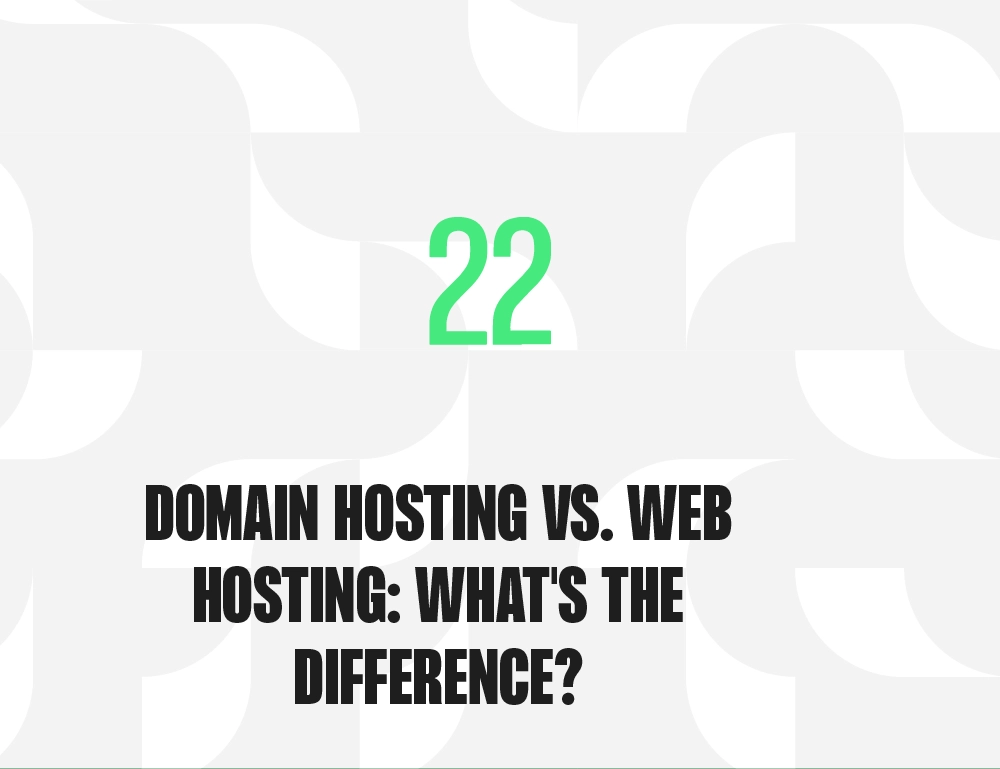When you embark on the journey of creating a website
You’ll often encounter the terms “domain hosting” and “web hosting.” While they may sound similar, they serve distinct purposes in the world of online presence. In this blog post, we’ll unravel the differences between domain hosting and web hosting, helping you gain a clearer understanding of these crucial components of your online presence.
Domain Hosting: Your Digital Address
Domain hosting is like the digital address of your website. It’s the unique web address that users type into their browsers to access your site. Here are the key aspects of domain hosting:
- Domain Name Registration: When you decide on a name for your website (e.g., www.yourwebsite.com), you need to register it with a domain registrar. Domain registrars are companies that manage domain names and ensure their uniqueness.
- Renewal and Ownership: Domain names are typically registered on an annual basis. It’s essential to renew your domain to maintain ownership and prevent it from being released back into the pool of available names.
- DNS Management: Domain hosting also involves managing DNS (Domain Name System) records. These records specify how your domain name should translate to an IP address, allowing users’ browsers to find your website’s server.
- Email Hosting: Many domain registrars offer email hosting services, allowing you to set up custom email addresses using your domain name (e.g., info@yourwebsite.com).
In summary, domain hosting primarily deals with the registration, management, and ownership of your website’s address.
Web Hosting: Where Your Website Lives
Web hosting, on the other hand, is where your website’s files, data, and content reside. It’s like the physical building that houses your business. Here are the essential aspects of web hosting:
- Server Space: Web hosting involves renting server space from a hosting provider. These servers are powerful computers designed to store and deliver your website’s content to visitors.
- Storage and Bandwidth: Web hosting packages come with varying amounts of storage space and bandwidth. The former determines how much data your website can store, while the latter defines the data transfer rate allowed for your site.
- Website Files: All the files, images, videos, and content that make up your website are stored on the web hosting server. These files are accessible to users when they visit your domain.
- Website Performance: The performance of your website, including speed and reliability, is heavily influenced by your web hosting provider. A reliable host ensures your website is accessible 24/7 and loads quickly.
In a nutshell, web hosting is where the technical infrastructure of your website is managed, ensuring it’s accessible to visitors worldwide.
The Symbiotic Relationship: Domain and Web Hosting
To create a functional website, you need both domain hosting and web hosting to work together seamlessly. Here’s how they interact:
- Domain Mapping: When you set up web hosting, you’ll connect your domain name to your hosting server using DNS settings. This mapping ensures that when users enter your domain name, they are directed to the correct web hosting server where your website’s files are stored.
- Email Integration: Domain hosting often includes email hosting services, allowing you to create custom email addresses using your domain. Web hosting, on the other hand, focuses on website content and functionality.
- Security and SSL: Both domain and web hosting play roles in website security. Domain hosting providers may offer SSL certificates, while web hosting providers implement security measures to protect your site’s files and data.
Conclusion:
In the world of website creation and management, understanding the difference between domain hosting and web hosting is essential. Your domain is your digital address, while web hosting provides the infrastructure for your website to function and be accessible online. Together, they form the foundation of your online presence, ensuring that your website has a unique address and a place to call home on the internet.
